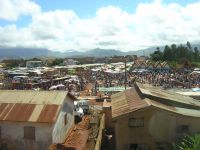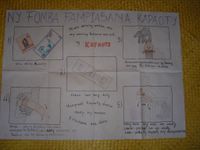i have been back now for a little more than 1 week. the transition/readjustment has been challenging. such a drastic contrast to what i grew accustomed to in madagascar. one extreme to the next...from scarcity to abundance (i.e. watching dirty, shoeless malagasy children sitting on the dirt road playing 'kitantara' with rocks...and loving it...to arriving here and being surrounded by many with their laptops, ipods, portable dvd players, digital cameras, and cellphones), quiet solo time to large-group social gatherings (centered around some significant family events in the way of a wedding and celebrating my parents' 50th anniversary). and any social skills i may have once had seem to have taken a hit from spending 8mos in a non-english speaking country. it's been a shock on the senses to say the least. and perhaps i should collect on the voucher i was given before leaving entitling me to three counseling sessions with a certified therapist for 'readjustment' purposes.
the most often asked question since returning is along the lines of, "glad to be back?". my reply has been something to the effect of...i'm alot of things and, yes, there's a bit of glad in there. but, there is quite a bit of remorse as well. remorse that i may never go back to this place that i gave some of myself to; that i may never see these people who i grew close to and care about; that i will lose the use of this newfound language. that's sad. there is already much about my existence in ambalavao that i miss and long for. the open-air market atmosphere, the necessity of walking or cycling from place to place vs. being dependent on an automobile, the forced self-reliance due to not having the option to simply run out to buy what you need (peanut butter jumps to mind), the small scale of commerce (esp. the roadside vendors) and knowing with pretty good certainty where your money is going. i think the supposition is that surely it must be a relief to be back and to have all the amenities and luxuries that we are privileged to have here in the US. but it certainly isn't all get and no give. yes...one gains much from returning to this setting but also loses a bit. i try to explain that yes, madagascar has more than it's fair share of problems, issues and challenges, esp. in the context of public health that are unique to being a poor, developing country in the tropics. but we too have ours that are very unique to this culture, lifestyle, and setting. much having to do with the fast-pace that is incredibly hard to keep up with (pretty certain there is no word or phrase for 'multi-tasking' in the malagasy language) and the stress that follows...in a rush much of the time with an endless to-do list; not knowing if we're coming or going...which results in a collective psyche that is highly scattered, distracted, and anxious much of the time. the overabundance of stimuli coming in contributing to short attention spans and poor listening and communication skills. not to mention the prevalence of such health issues as diabetes, colon cancer, and joint deterioration/arthritis often the result of poor diet and exercise. and yet, most malagasy believe, from any exposure they've had to life in the US (mostly in the form of film and music videos), that all one needs to do is arrive to the United States and life is handed to you. the land of plenty (which it is), of milk and honey. i always did my best to dispel this myth and try to explain that life's hard, no matter where one lives. you simply trade one variety of challenges and problems for another.
so my reasons for opting out...a totality of reasons for sure but primarily related to work and family. i have my RN license but always made the point to declare when it came up that i am still much more a nursing school graduate than a nurse...having just graduated from nursing school before arriving to madagascar. and simply felt that my schooling and license were being under-applied in this role and setting. i went through alot to get this license and it's time to start using it in a bonafide nursing position. i was drawn and sought out this opportunity because i was not (and still am not) much tempted by taking a conventional nursing position in a busy, fast-paced, understaffed hospital with a lop-sided patient-to-nurse ratio...a lose-lose arrangement for both nurse and patient. and one that would be a disservice to myself and any patients that fell under my care. and i am still hoping to avoid such a setting. and thought this a worthy avenue to get into public health. which is still quite a viable possibility down the road after paying my dues, and spending a substantial amount of time in a clinical, curative setting.
i have my work cut out for me in putting the pieces in place for what lies ahead. there are any number of possible scenarios and the crystal ball is a little hazy (as our 60yr old crew boss from my seasons on a backcountry trails crew in the tetons was apt to say...miss you GW)...but before too long i should be working as an RN in Colorado. Fell in love with the mountains years ago and looking forward to continuing the affair. i am trying to approach this process of getting 'settled' and established as a welcome challenge vs. drudgery. for 'it' becomes what we tell ourselves it is.
i thank you all for taking an interest in my endeavors, lending support, and wishing me well. i still have hopes and ideas to post some pics now that i have steady access to the web. may you be free from all internal and external harm. happy, joyful and light. healthy and well. and may you live at ease from well-being.
Read More!


















